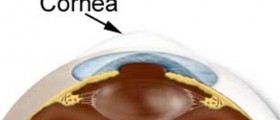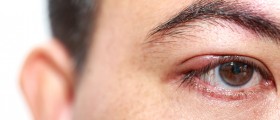
Herpes simplex virus is an infectious agent capable of causing a variety of infections in humans. For instance, it is a culprit of oral herpes, genital herpes and may even cause ocular form of the disease. In immunocompromised individuals herpes virus may also cause systemic infections or even encephalitis. Once the virus gets into our body, it is never completely eradicated and, therefore, it may lead to recurrent infections.
Ocular Herpes
As far as ocular herpes is concerned, the infection usually occurs due to Herpes simplex virus type 1. Type 2 Herpes simplex virus is generally associated with genital infections.
Herpes simplex virus type 1 affects the cornea and may cause severe complications or even completely ruin the structure of this organ. As a result, patients might completely lose their sight.
The infection predominantly stays localized on one eye and rarely spreads to the other. Also, it is not likely for ocular herpes to be spread from one person to another. Ocular Herpes Clinical Characteristics
As it is the case with any other viral infection of the eye, ocular herpes is characterized by redness and inflammation of the eye, light sensitivity, decreased vision, excess tearing, eye irritation and scratchiness. More severe cases of ocular herpes cause formation of an ulcer on the cornea.
The inflammation of the cornea caused by Herpes virus is known as herpes keratitis. The infection affects only superficial layers (the epithelium only) or spreads onto deeper layers of the cornea. Superficial infection is not to severe and heals without scarring. However, if deeper layers of the cornea are damaged, healing is accompanied by scarring and this leads to partial or even complete loss of vision.
In rare cases Herpes virus may penetrate into deeper tissues of the eye and initiate herpes uveitis or herpes retinitis.Ocular Herpes Treatment Options
This infection requires prompt medical care and treatment. Patients are prescribed antiviral eye medications in a form of tear drops or ointments. These are supposed to be applied frequently, sometimes even per hour.
In some cases the surface of the cornea needs to be scraped, the affected eye is patched and one receives additional drugs such as pain killers.
Severe scarring of the cornea and vision loss are indications for corneal transplant. It is essential never to treat the condition on your own because the damage may be even greater. Finally, some patients may be prescribed medications which will prevent recurrent ocular herpes infections.

















Your thoughts on this
Loading...